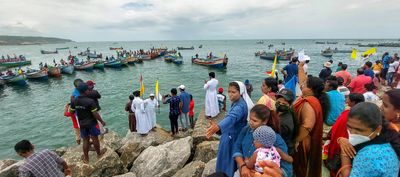This is a story with a difference. At a time when the Latin Catholic archdiocese of Trivandrum has entered the news for leading an agitation of the fishing community against the development of Vizhinjam port, and thereby incurred the tag of ‘anti-development’, I want to challenge that narrative.
The Church agrees with those who believe that the rampant problem of coastal erosion has been worsened by the port construction. That is grounds for a separate discussion, since many argue that the vexed problem of sea inundation precedes the development of the port. But one thing that I, as MP for Thiruvananthapuram, can vouch for is that the Church is not anti-development.
To explain why, let me go back six decades. When our nation’s scientists, led by the legendary Dr Vikram Sarabhai, began to develop the contours of India’s nascent space programme in the early 1960s, the coastal village of Thumba was identified as an ideal location, given its latitude and natural features, to allow for rocket launches and allied research.
The catch, however, was that the land the community of scientists had identified in Thumba housed the St Mary Magdalene church and bishop Peter Bernard Pereira’s official residence. In any other community or for that matter in any other part of the world, the matter might have been put to rest then and there. After all, the idea of displacing an active spiritual establishment would certainly have evoked outrage and fury, especially in today’s India. But in this then relatively obscure part of Thiruvananthapuram district, when a decision of national importance and scientific progress presented itself, the community chose to make a remarkably patriotic choice—a choice for development and progress.
When initial conversations with local politicians and bureaucrats made little headway, Dr Sarabhai turned to bishop Pereira for his guidance. The bishop, after understanding the proposed mission of the scientists, asked Dr Sarabhai to come to the church on the following Sunday. During the service, bishop Pereira presented the proposition before the congregation. “My children, I have a famous scientist with me who wants our church and the place I live in for the work of space science research,” he explained. “Dear children, science seeks truth by reasoning. In one way, science and spiritualism seek the same divine blessings for doing good for the people. My children, can we give God’s abode for a scientific mission?” The answer—quite literally—was a resounding “Amen”. The church and the bishop’s house as well as other neighbouring inhabited areas were handed over to Dr Sarabhai and his team.
Thus was established, in 1962, the Thumba Equatorial Rocket Launching Station (TERLS, which would be renamed Vikram Sarabhai Space Centre, or VSSC, after the death of the legendary scientist nine years later). A year later India launched its first two-stage rocket from TERLS, marking our first foray into space. As the late president Dr A.P.J. Abdul Kalam, who was part of the original launch team, and who went on to work from the church building himself, wrote later, looking back at this memorable episode:
“Today, among us, Prof Vikram Sarabhai is not there, Rev Dr Peter Bernard Pereira is not there, but those who are responsible for the creation and make the flower and blossom will themselves be a different kind of a flower as described in the Bhagwad Gita: ‘See the flower, how generously it distributes perfume and honey. It gives to all, gives freely of its love. When its work is done, it falls away quietly. Try to be like the flower, unassuming despite all its qualities’.”
Those qualities have been typified by the members of the Latin Catholic Archdiocese of Trivandrum. They are not anti-development. But they fear for the very existence of the Catholic fishing community when they see their homes topple into the sea from fierce inundations. That is a problem that needs attention and resources, to build sea-walls and groynes to save the coast, and to provide compensation and rehabilitation for the devastated fisherfolk. It is not going to be solved by unjustly abusing those who have proved their patriotism time and time again.


